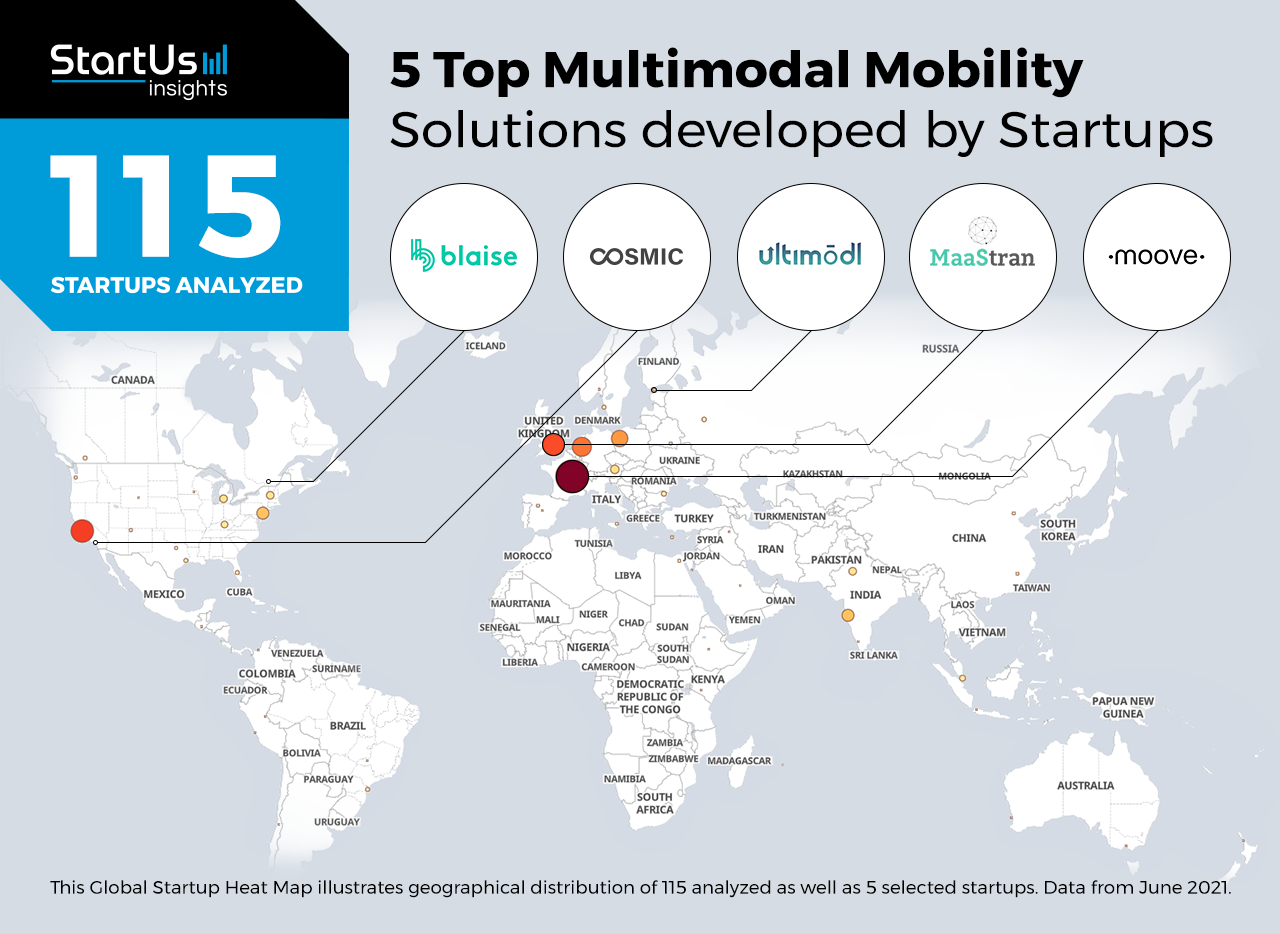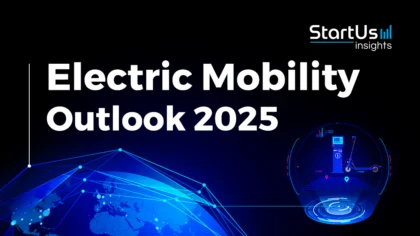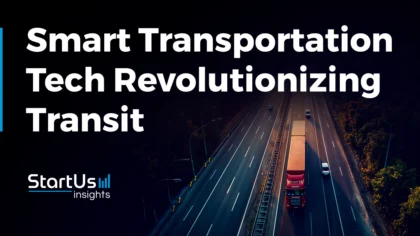Staying ahead of the technology curve means strengthening your competitive advantage. That is why we give you data-driven innovation insights into the mobility industry. This time, you get to discover 5 hand-picked startups developing multimodal mobility solutions.
Global Startup Heat Map highlights 5 Top Multimodal Mobility Solutions out of 115
The insights of this data-driven analysis are derived from the Big Data & Artificial Intelligence-powered StartUs Insights Discovery Platform, covering 2.093.000+ startups & scaleups globally. The platform gives you an exhaustive overview of emerging technologies & relevant startups within a specific field in just a few clicks.
The Global Startup Heat Map below reveals the distribution of the 115 exemplary startups & scaleups we analyzed for this research. Further, it highlights 5 mobility startups that we hand-picked based on criteria such as founding year, location, funding raised, and more. You get to explore the solutions of these 5 startups & scaleups in this report. For insights on the other 110 multimodal mobility solutions, get in touch.
MaaStran enables Multimodal Transport Ticketing
Many people that travel using public transit take multiple buses or trains, as well as other modes of transport for the last-mile. However, a lot of time is wasted buying tickets for each step of the journey and when switching vehicles. To address this, smart cities and transport operators are working on multimodal travel solutions that offer a seamless experience. A crucial enabler of multimodal travel is a universal ticket that allows commuters to travel in different modes of transport.
British startup MaaStran develops a ticketing solution for multimodal transport. The startup’s solution integrates multiple modes and operators, including rail, bus, and tram operators. This enables seamless long-haul journeys while reducing the overall costs and time spent in queues. Moreover, it provides tap on/tap off payments, automatic fare calculation, and aggregation & capping to make payments convenient.
ultimodl offers a Multimodal Mobility Framework
As cities seek to promote sustainable mobility, multimodal mobility solutions are becoming an increasingly vital part of smart cities. This is why cities are integrating different types of transits into integrated solutions, thereby improving the attractiveness of public transport. However, it requires planning across time and space, which makes it difficult to model. This is why mobility startups develop multimodal mobility frameworks to resolve this.
Estonian startup ultimodl provides a multimodal mobility framework. It uses AI to increase the efficiency, accessibility, and usage of multimodal mobility solutions. By democratizing the urban mobility framework, it enables cities to implement safe and convenient public commuting. The startup’s solutions remove cars from roads, making cities more walkable.
Cosmic enables Automated Mobility Businesses
A hurdle for true multimodal travel is the patchiness in the spread of urban mobility solutions. Some regions have a lot of options, whereas others are underserved. To further multimodal mobility, startups are helping local entrepreneurs use their spaces to host and run mobility solutions. Such solutions generally automate the entire process from buying vehicles to finding customers, or at least some parts of it.
Cosmic is a US-based startup that offers an automated mobility business solution. The startup’s platform empowers local entrepreneurs to run their own mobility businesses. It manages end-to-end operations from setting up supply chains of vehicles and mobility vending machines to finding paying customers. This connects these entrepreneurs with local businesses such as hotels, apartments, and parking lots to further advance the transition to shared mobility.
Moove Technologies offers a Multimodal Travel App
Multimodal mobility goes beyond urban mobility to travel across countries. For instance, in recent years, there has been a push towards European Union (EU)-wide multimodal mobility. Multimodal bookings allow travel operators to maximize profits without burdening the passengers. For the passengers, in addition to reducing carbon footprint, this reduces cost and improves efficiency and flexibility.
Moove Technologies is a French startup that develops a travel app for integrated mobility services. It provides a hassle-free experience for booking train journeys and urban mobility experiences across Europe. The app provides the best travel options for both personal and business trips. Moreover, it allows users to add discount cards and travel companions further reduce the cost of the trips.
Blaise Transit facilitates On-Demand Transit
The infrequent and uncertain nature of public transit deters many commuters from using it. To address this challenge, mobility startups are working on on-demand or demand-responsive transit services. These services pick and drop passengers along flexible routes, improving the overall passenger experience. By integrating with other urban mobility solutions, these solutions further the multimodal mobility trend.
Canadian startup Blaise Transit offers an on-demand transit solution. It allows users to book rides with transit operators for desired arrival or departure times. Upon booking, it matches users with other passengers traveling along a similar route. The startup’s solution uses AI to continuously optimize routes to accommodate new requests. Moreover, it helps transit agencies offer on-demand services and increase the cost-recovery ratio.
Discover more Mobility Startups
Mobility startups such as the examples highlighted in this report focus on connected cars, in-vehicle services, autonomous vehicles as well as shared mobility. While all of these technologies play a major role in advancing the mobility industry, they only represent the tip of the iceberg. To explore more mobility technologies, simply get in touch to let us look into your areas of interest. For a more general overview, you can download our free Mobility Innovation Report to save your time and improve strategic decision-making.









